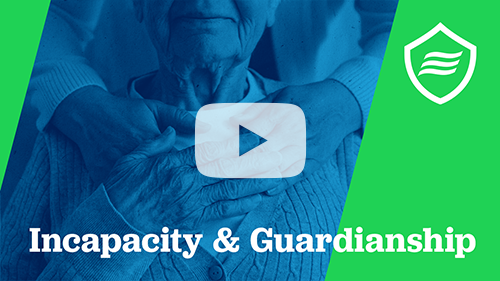UNDERSTANDING GUARDIANSHIP AND INCAPACITY
Protecting Your Future With Proper Planning
Incapacity can lead to court-ordered guardianship without proper estate planning and legal strategies.

Guardianship and Incapacity Explained
When individuals face incapacity and can no longer make competent decisions about their health, finances, or personal affairs, complex legal issues arise that impact both the individual and their loved ones. Incapacity can lead to guardianship proceedings where a court can remove an individual's decision-making rights and transfer them to another person. Both incapacity and guardianship represent significant challenges to personal autonomy and independence. Understanding these interconnected legal concepts and planning ahead can help you maintain control over your future and avoid court-imposed guardianship while addressing the realities of potential incapacity.
What Is Guardianship?
Guardianship is a legal arrangement where a court determines that an individual lacks the capacity to make responsible decisions and appoints another person (the guardian) to make decisions on their behalf. The person under guardianship (the ward) loses their legal right to make decisions in the areas covered by the guardianship order.
This legal process represents a fundamental shift in an individual's rights and independence. A guardian may be granted authority over:
- Managing the ward's finances and property
- Making health care decisions
- Determining living arrangements
- Ensuring personal needs are met
- Protecting the ward from exploitation or harm
The extent of a guardian's authority depends on the court's determination of the ward's capacity and needs. While guardianship serves to protect vulnerable individuals, it comes at the cost of personal autonomy and decision-making freedom.

Understanding Incapacity and Its Relationship to Guardianship
What Is Incapacity?
Incapacity refers to a person's inability to make or communicate responsible decisions regarding their personal care,
health, or finances.
This condition may result from:
- Mental illness or cognitive disorders
- Developmental disabilities
- Physical illness or disability
- Chronic substance abuse
- Age-related cognitive decline
- Other conditions affecting cognitive function
Incapacity is ultimately a legal determination made by a court, not simply a medical diagnosis. Courts must find clear and convincing evidence of incapacity before they can appoint a guardian and remove an individual's decision-making rights.
The Legal Process for Determining Incapacity
The determination of incapacity follows a formal legal process designed to protect individual rights while ensuring appropriate intervention when necessary.
The process begins when someone files a petition with the court alleging incapacity. The court then conducts an investigation, typically involving medical professionals and social workers who evaluate the alleged incapacitated person's cognitive abilities and functional capacity.
A formal capacity hearing follows, where evidence is presented and the alleged incapacitated person has important legal rights, including representation by an attorney, the ability to present evidence, cross-examine witnesses, and in some jurisdictions, request a jury trial.
Based on the evidence presented, the court makes its determination about whether the individual lacks capacity and, if so, what type and scope of guardianship is necessary. If incapacity is established, the court appoints a guardian with specific powers tailored to address the individual's particular needs and limitations.
This process emphasizes due process protection while ensuring that individuals who genuinely cannot make responsible decisions receive necessary support and protection.
Types of Guardianship
Courts typically prefer the least restrictive form of guardianship that adequately addresses the individual's needs, recognizing that any guardianship involves a loss of personal rights.

Types of Guardianship
Courts typically prefer the least restrictive form of guardianship that adequately addresses the individual's needs, recognizing that any guardianship involves a loss of personal rights.

Full (Plenary) Guardianship
Full guardianship grants comprehensive decision-making authority to the guardian, completely removing the ward's right to make decisions. This extensive arrangement is appropriate only when the ward is unable to make responsible decisions in any area of their life. The guardian assumes control over all financial matters, health care decisions, personal affairs, living arrangements, and legal matters.
Limited Guardianship
Limited guardianship restricts the guardian's authority to specific areas where the ward needs assistance, allowing the individual to retain decision-making rights in areas where they maintain capacity. This approach recognizes that incapacity is not always total and that individuals should retain as much autonomy as possible.
Common forms include guardianship of the person, which covers personal care, health care, and living arrangements, and guardianship of the estate, which manages financial affairs and property. Temporary guardianship provides limited-duration authority, often for emergency situations or specific events.
Emergency Guardianship
Emergency guardianship provides immediate protection when there's an urgent need to prevent harm. This temporary arrangement allows for quick intervention while a more permanent solution is developed through the regular guardianship process.
The Guardian Appointment Process
The appointment of a guardian follows these general steps:
- Nomination: Courts typically prioritize individuals previously nominated by the ward (in advance directives), followed by spouses, adult children, other family members, or professional guardians.
- Background Screening: Potential guardians undergo criminal background checks, credit checks, and reviews of any history of abuse or exploitation.
- Training Requirements: Many jurisdictions require guardians to complete training on their legal responsibilities and ethical obligations.
- Bond Requirement: Guardians managing significant assets may need to post a bond as financial protection for the ward.
- Court Supervision: Guardians must regularly report to the court regarding the ward's condition and how assets are being managed.
The court aims to appoint someone who will act in the ward's best interest, respect their preferences when possible, and provide appropriate care while protecting them from harm.
Planning Ahead to Avoid Court-Appointed Guardianship
The most effective way to avoid court-appointed guardianship is comprehensive advance planning while capacity remains intact:
Create a revocable living trust
Revocable living trusts allow you to maintain control while capable, with a successor trustee assuming responsibility when needed.
- Provide seamless asset management during incapacity without requiring court involvement
- Offer both flexibility and protection for your financial interests
- Allow you to maintain control while capable
- Enable successor trustee to assume responsibility when needed
- Special needs trusts can manage assets for individuals with disabilities without affecting government benefit eligibility
Establish Durable Powers of Attorney
Powers of attorney designate trusted individuals to make decisions when the principal becomes unable to do so.
- Select trusted agents for both health care and financial decisions who understand your values
- Choose agents who will respect your wishes and are willing and able to serve when needed
- Durable financial powers of attorney authorize an agent to manage financial affairs
- Health care powers of attorney appoint a health care proxy to make medical decisions
- Make these appointments carefully, as these individuals will have significant authority over your affairs
Create Detailed Advance Directives
Advance directives allow individuals to document their wishes while they retain capacity.
- Develop directives that address health care decisions and provide guidance for financial management
- Nominate preferred guardians if guardianship becomes unavoidable
- Health care directives or living wills specify medical treatment preferences, particularly for end-of-life care
- Mental health directives provide instructions for mental health treatment during periods of incapacity
- Ensure these documents reflect your values and specific preferences for various scenarios
Regular Updates and Communication
Review and update all legal documents periodically to ensure they remain current and effective.
- Update documents after major life changes, relationship changes, relocations, or health status changes
- Review all documents periodically to ensure they reflect your current wishes
- Discuss your wishes with family members and designated agents
- Ensure designated agents understand your preferences and are prepared to act when necessary
- Maintain open communication about your planning decisions with those who will be involved
Supported Decision-Making Agreements
This emerging alternative recognizes that many individuals can make decisions with appropriate support rather than having their decision-making authority removed entirely.
- Provide assistance understanding options and available choices
- Help communicate decisions clearly to relevant parties
- Support implementing choices while preserving personal autonomy
- Recognize that decision-making capacity exists on a spectrum
- Offer a less restrictive alternative to traditional guardianship arrangements

GET YOUR FREE COPY
OF "INCAPACITY AND AVOIDIING
GUARDIANSHIP" TODAY!

Frequently Asked Questions
Q: How is incapacity legally determined?
Incapacity is determined through a legal proceeding where medical evidence, expert testimony, and functional assessments are presented. The court makes the final determination based on whether the individual can understand and make responsible decisions regarding their personal care, health, or finances.
Q: Can guardianship be contested?
Yes. The alleged incapacitated person can contest guardianship proceedings with legal representation. Family members or interested parties can also challenge the need for guardianship or contest who is appointed as guardian.
Q: Is guardianship permanent?
Not necessarily. Guardianship can be modified or terminated if:
- The ward regains capacity
- Less restrictive alternatives become available
- The current guardianship arrangement is no longer appropriate
Q: Who monitors guardians to prevent abuse?
Courts maintain oversight through:
- Required regular reporting by guardians
- Court investigators who may conduct visits
- Financial accountings that must be filed periodically
- The ability of interested parties to report concerns to the court
Q: What's the difference between guardianship and conservatorship?
What's the difference between guardianship and conservatorship?
- Guardianship typically refers to authority over personal and health care decisions
- Conservatorship often refers to authority over financial matters
However, in some states, these terms are used interchangeably or have different meanings.
Q: Can I choose who will be my guardian if I become incapacitated?
While courts make the final decision, you can nominate your preferred guardian in advance directives. Courts typically honor these nominations unless there are compelling reasons not to do so.
Conclusion
Understanding the relationship between guardianship and incapacity is crucial for protecting vulnerable individuals while respecting their autonomy. By recognizing the various types of guardianship, the legal processes involved, and the available alternatives, families can make informed decisions that balance protection with dignity.
The best approach is preventive planning—creating comprehensive legal documents while capacity remains intact. This allows individuals to maintain control over who will make decisions for them if they become unable to do so themselves, avoiding the potential complications of court-appointed guardianship.





